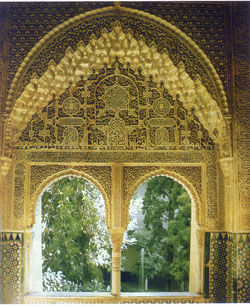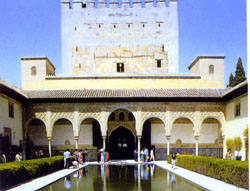Will Arab Culture Rise Again?
by Khalaf Al Habtoor
 During a recent visit to
the Spanish cities of Seville and Cordoba I was deeply moved and proud as I realised that for more than seven hundred years, beginning in 710 AD, Arab people continually developed one of the most sophisticated civilisations of the Middle Ages. In doing so they created two of the most memorable cities in Europe containing some of the most beautiful buildings in the world. Two of the most notable of which are the Grand Mosque in Cordoba and the Alhambra Palace in Granada.
During a recent visit to
the Spanish cities of Seville and Cordoba I was deeply moved and proud as I realised that for more than seven hundred years, beginning in 710 AD, Arab people continually developed one of the most sophisticated civilisations of the Middle Ages. In doing so they created two of the most memorable cities in Europe containing some of the most beautiful buildings in the world. Two of the most notable of which are the Grand Mosque in Cordoba and the Alhambra Palace in Granada.
To give some idea of how advanced Islamic society had become in Cordoba, at the height of its flowering in the ninth and tenth centuries, there were more than 200,000 houses, six hundred mosques, nine hundred public baths, fifty hospitals and several large markets which catered to all forms of trade and commerce, including 15,000 weavers. At a time when you could walk through Cordoba's streets for ten miles in one direction at night and always have the light of lamps to guide your way, the rest of Europe had not even have established cities in the sense that we know them today. Seven hundred years after the streets of Cordoba were lit, street lighting would still be an innovation in London and Paris.
But that Arab world is very different from the one we know today. The new Arab cultures and civilisations have emerged only over the last seventy years from the ruins of the Ottoman Empire. It is composed of new political entities, made up primarily of nation states that did not exist before the First World War. It is new in its freedom to guide its destiny without the restraints of colonialism. It is also new in its social, economic and cultural aims and institutions, and in its rapid absorption of the ways of scientific and technological world civilisation.
In this atmosphere of newness, with all its potential for further achievement, the past of our ancestors may seem remote and irrelevant. Their achievements were made centuries ago, in a world very different from the one we know today. Ma Fat Mat! (what has sped is dead!) the proverb tells us. But this is not true. We can no more deny our past then we can our heredity. Our past lives on, not merely as history, but much more in the character and identity of our people, even if sometimes they are unaware of it. Our past is a glorious one that has added much to human achievement. There are lessons to be learned from our past that can be of use in this modern age. Our past can be the source of our renaissance.
It was not only an empire that we Arabs built but a culture as well. We are heirs to the ancient civilisations that flourished along the banks of the Tigris, the Euphrates, the Nile and along the eastern shore of the Mediterranean. We absorbed and assimilated the main features of Greco Roman culture. We then turned all these influences into something unique, a culture that acted as the catalyst for the flowering of knowledge in mediaeval Europe. No other people in the Middle Ages contributed so much to human progress as the Arabs and Arabic speaking people.
Our language, Arabic, was the language of learning for many centuries in the Middle Ages. Between the ninth and twelve centuries more philosophical, medical, historical, religious, astronomical and geographical works were produced in Arabic than in any other tongue. It is a fact that the languages of western Europe still show many marks of this cultural flowering in the form of many words and place names. It is a little known fact that the European system of numbering is taken directly from Arab numerals.
Islam
 It was the introduction of Islam into our society that generated all this creative activity within our Arab consciousness. Providing purpose and a new sense of direction, it unified our ancestors in Arabia, inspired leadership, and let loose collective and individual genius. Through the centuries, Arab society founded and developed a culture that made great contributions in every field Ð in literature, theology, philosophy, science, geography and architecture. There are many notable Arabic names and notable Arab achievements. It can be said that under Islam, and through the unifying bond of a common language, civilisation took a big step forward.
It was the introduction of Islam into our society that generated all this creative activity within our Arab consciousness. Providing purpose and a new sense of direction, it unified our ancestors in Arabia, inspired leadership, and let loose collective and individual genius. Through the centuries, Arab society founded and developed a culture that made great contributions in every field Ð in literature, theology, philosophy, science, geography and architecture. There are many notable Arabic names and notable Arab achievements. It can be said that under Islam, and through the unifying bond of a common language, civilisation took a big step forward.
It was the achievements of Islamic civilisation that allowed Europe to drag itself out of the dark age into the light of the Renaissance and establish a cultural identity. This laid the foundation for Europe's great cities, allowed it to make progress in the arts and sciences and through contact with the sophisticated Arab merchants and traders enabled it to develop commerce and trade. The sophistication and beauty of Arab cities can be read about in the eye witness reports describing the astonishment of the soldiers and officers of the Christian armies that conquered Islamic Spain, when in 1248 they looked upon the city of Seville. Christians had never seen its like, for there was no city in Christian Europe that could rival it in art, economic splendour, civil organisation, technology, and scientific and literary productivity.
It was at this time, through weak leadership and internal rivalries, that the Arab world started to decline and slide into its own dark age that was to last more than four centuries. During this period an atmosphere of frustration and discouragement arose throughout all of the Islamic lands. People felt that the days of conquest and glory were over. There was a sense that we had contributed all we could and there was nothing new to discover. Increasingly, speculative thought was confined to narrow areas, scientific enquiry stagnated and matters that had been studied and understood became lost. As knowledge disappeared, creative thinking and the spirit of discovery were replaced by repetition and imitation. Cultural life became restricted to the elite. Society at large was fed the glories of the past and made to close its mind to any prospect of evolution or progress.
This led the to the stagnation of Arab Islamic culture and science during the centuries of Ottaman rule. This stagnation allowed European countries to catch up and overtake the Arabs in all areas of knowledge, which resulted in the western Christian countries developing industrial societies that gave them the benefit of new technologies and mass production.
Awakened
It was not until the nineteenth century that we reawakened to the idea of our Arab identity. It gave rise to a search for self awareness and there was a renewal of independent thinking, stimulated in part by exposure to the ideas of others, particularly the scientists and scholars who accompanied the French invasion of Egypt early in the nineteenth century. During the end of the century intensive contact along the borders of the eastern Mediterranean with European civilisation allowed western scholars, teachers, doctors, engineers, architects and industrialists to enter Arab lands. In return, missions were sent by Islamic countries to Europe to study mathematics, medicine and the sciences. Despite the problems that arose with this meeting of cultures the effect was to stimulate a new desire for evolution and progress by Arab people and encouraged a desire to catch up with the more advanced industrial world.
We now stand today as we stood in the past: in a strategically important geographical position astride one of the world's greatest arteries of trade, bridging the gap between East and West. We have also reached a point were we must recognise that to continue into the next century and realise our ambitions as an enlightened civilisation that is equal to that of both Europe and Asia, we must equip ourselves, through education, with the knowledge to tackle head on the problems that we will all face in the future. But before we are able to do this we must ask ourselves that why, even with our wealth of natural resources and manpower, are we are still falling behind other civilisations? What is it about our society that handicaps us when competing in the global arena?
We must analyse our weaknesses and work together as a united people to rectify them and not be afraid to interact with other cultures and compete with them. For it is only by daring to succeed as a unique culture of equal worth that we will be able to achieve a future that sees our way of life as a source of inspiration for our people. A future in which Arab culture develops and progresses, reaching outward for the knowledge needed to restore it to a position of prestige among the other great cultures of the world to enable us to enjoy the benefits of the gifts we gave to humanity centuries ago.